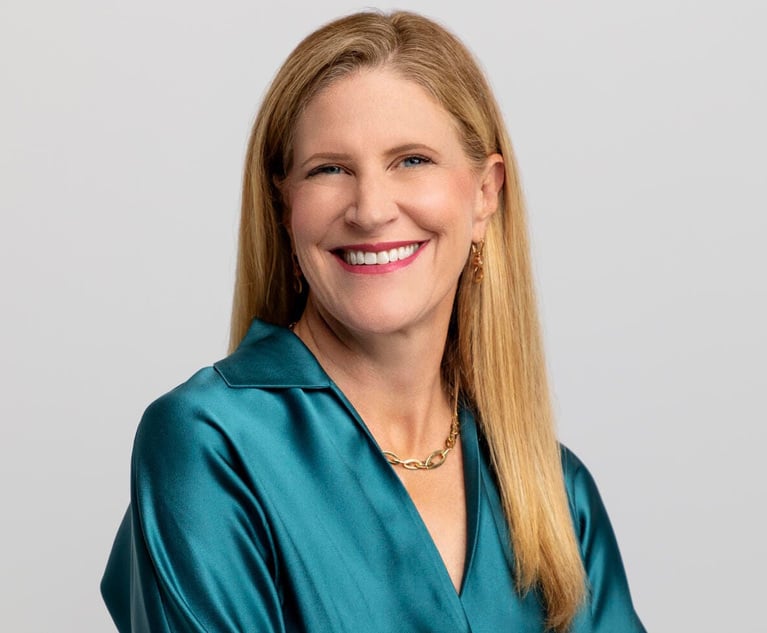Insurance Exec to General Counsel: Help Fight Meritless Securities Suits or Pay More
“This isn't just an insurance problem. General counsel need to understand that ultimately this is all going to come back as costs to their companies,” Chubb's executive vice chairman and chief operating officer told Corporate Counsel,
June 11, 2019 at 07:00 AM
5 minute read
 John Keogh, Chubb. Courtesy photo
John Keogh, Chubb. Courtesy photo
If anyone understands the financial impact of often frivolous securities class action litigation on a company and its officers, it is Chubb, the world's largest publicly traded property and casualty insurance company.
Zurich-based Chubb, which includes insurance coverage for corporate directors and officers, has pulled together an array of data and analyses from expert sources in a white paper showing the alarming rate of suit filings with ever-climbing costs.
Released Tuesday, the report, “From Nuisance to Menace: The Rising Tide of Securities Class Action Litigation,” aims to “raise awareness about this problem and to work on behalf of American business to effect meaningful reform”—especially among general counsel.
John Keogh, Chubb's executive vice chairman and chief operating officer, told Corporate Counsel, “This isn't just an insurance problem. General counsel need to understand that ultimately this is all going to come back as costs to their companies.”
Keogh said he has had to deal with general counsel who are friends and have had to go tell their board of directors that their D&O insurance costs are going way up, or that they can't have the same coverage as they've had in the past.
“We want them to see the impact and the cost to American business. We want them to get involved and lend their voices to the issues and support the reforms,” he added.
He said the impact is primarily in the U.S., because of its unique legal system. Two other places where he sees similar trends in skyrocketing securities litigation and costs are the U.K. and Australia.
Keogh explained in 2017 and 2018 the number of securities class action lawsuits filed in federal court broke new records each year, and the volume of suits is now twice the rate of 2014. “And this is likely the new norm,” he said.
The main financial awards from these lawsuits, Keogh said, are going to lawyers, both those who bring the cases and defend them. In the last five years, half of the nearly $23 billion in securities claims costs have gone to the lawyers, according to the report.
“The system is broken,” Keogh said, when over 5,000 cases have been filed since 1996 but less than 25 went to trial.
Most of the cases are settled, he said, and in 85% of those settlements, no money went to the shareholders who brought the suits. “What's the point?” Keogh asked. “Just to make the lawyers rich?”
The report offers five reform ideas, recommending Congress should:
- Legislate to end the filing of the class actions in both state and federal courts, and restrict them to federal courts.
- Take action to require that fees paid to lawyers be proportional to the amount of damages paid to the class, perhaps by appointing a special “fees” master. Keogh said he thinks proportionality is the most important reform of all.
- Require plaintiffs to actually be present and involved in the cases.
- Require the disclosure of the relationship between plaintiffs and their lawyers, especially lawyers who serve only as third-party intermediaries and refer plaintiffs but do no actual work on the case. Some experts suggest no referrals should be allowed.
- Fast-track decisions on motions to dismiss, allowing interlocutory appeals if the motion is denied.
Several experts quoted in the report also supported getting the U.S. Securities and Exchange Commission involved in reforms.
Gerard Pecht, global head of dispute resolution and litigation at Norton Rose Fulbright US, said the commission could take a closer look at litigation and identify repeat filers and attorneys who abuse the system.
“The SEC can then join the most problematic cases as an amicus in support of dismissal,” says Houston-based Pecht.
Bruce Vanyo, head of securities litigation at Katten Muchin Rosenman, suggests the SEC could refine its rules on what must be disclosed in a proxy statement for a merger transaction.
Chubb's Keogh has one more suggestion: Take the meritless cases to trial.
“Plaintiffs' lawyers are of a mind that general counsel at defending companies are going to decide that cases aren't worth the fight, even if they are meritless and highly defensible, because of the cost and the involvement of company executives and board members,” Keogh said.
“But I would encourage them to take these cases to a courtroom rather than settling,” he said. “And we as an insurance company would stand right there beside them.”
He said if the companies and their general counsel don't want to bother with the litigation and just want to settle, the insurance company usually has to honor that decision.
But he warned that such decisions will impact the future cost and coverage of corporate insurance.
This content has been archived. It is available through our partners, LexisNexis® and Bloomberg Law.
To view this content, please continue to their sites.
Not a Lexis Subscriber?
Subscribe Now
Not a Bloomberg Law Subscriber?
Subscribe Now
NOT FOR REPRINT
© 2025 ALM Global, LLC, All Rights Reserved. Request academic re-use from www.copyright.com. All other uses, submit a request to [email protected]. For more information visit Asset & Logo Licensing.
You Might Like
View All
Former Capital One Deputy GC Takes Legal Reins of AIG Spinoff

Financial Services Has a Trust Problem. Can GCs Help Right the Ship?


Longtime GC of Big Medicaid Insurer Out Amid C-Suite Shakeup
Trending Stories
- 1'Astronomical' Interest Rates: $1B Settlement to Resolve Allegations of 'Predatory' Lending Cancels $534M in Small-Business Debts
- 2Senator Plans to Reintroduce Bill to Split 9th Circuit
- 3Law Firms Converge to Defend HIPAA Regulation
- 4Judge Denies Retrial Bid by Ex-U.S. Sen. Menendez Over Evidentiary Error
- 5Lawyers: Meet Your New Partner
Who Got The Work
J. Brugh Lower of Gibbons has entered an appearance for industrial equipment supplier Devco Corporation in a pending trademark infringement lawsuit. The suit, accusing the defendant of selling knock-off Graco products, was filed Dec. 18 in New Jersey District Court by Rivkin Radler on behalf of Graco Inc. and Graco Minnesota. The case, assigned to U.S. District Judge Zahid N. Quraishi, is 3:24-cv-11294, Graco Inc. et al v. Devco Corporation.
Who Got The Work
Rebecca Maller-Stein and Kent A. Yalowitz of Arnold & Porter Kaye Scholer have entered their appearances for Hanaco Venture Capital and its executives, Lior Prosor and David Frankel, in a pending securities lawsuit. The action, filed on Dec. 24 in New York Southern District Court by Zell, Aron & Co. on behalf of Goldeneye Advisors, accuses the defendants of negligently and fraudulently managing the plaintiff's $1 million investment. The case, assigned to U.S. District Judge Vernon S. Broderick, is 1:24-cv-09918, Goldeneye Advisors, LLC v. Hanaco Venture Capital, Ltd. et al.
Who Got The Work
Attorneys from A&O Shearman has stepped in as defense counsel for Toronto-Dominion Bank and other defendants in a pending securities class action. The suit, filed Dec. 11 in New York Southern District Court by Bleichmar Fonti & Auld, accuses the defendants of concealing the bank's 'pervasive' deficiencies in regards to its compliance with the Bank Secrecy Act and the quality of its anti-money laundering controls. The case, assigned to U.S. District Judge Arun Subramanian, is 1:24-cv-09445, Gonzalez v. The Toronto-Dominion Bank et al.
Who Got The Work
Crown Castle International, a Pennsylvania company providing shared communications infrastructure, has turned to Luke D. Wolf of Gordon Rees Scully Mansukhani to fend off a pending breach-of-contract lawsuit. The court action, filed Nov. 25 in Michigan Eastern District Court by Hooper Hathaway PC on behalf of The Town Residences LLC, accuses Crown Castle of failing to transfer approximately $30,000 in utility payments from T-Mobile in breach of a roof-top lease and assignment agreement. The case, assigned to U.S. District Judge Susan K. Declercq, is 2:24-cv-13131, The Town Residences LLC v. T-Mobile US, Inc. et al.
Who Got The Work
Wilfred P. Coronato and Daniel M. Schwartz of McCarter & English have stepped in as defense counsel to Electrolux Home Products Inc. in a pending product liability lawsuit. The court action, filed Nov. 26 in New York Eastern District Court by Poulos Lopiccolo PC and Nagel Rice LLP on behalf of David Stern, alleges that the defendant's refrigerators’ drawers and shelving repeatedly break and fall apart within months after purchase. The case, assigned to U.S. District Judge Joan M. Azrack, is 2:24-cv-08204, Stern v. Electrolux Home Products, Inc.
Featured Firms
Law Offices of Gary Martin Hays & Associates, P.C.
(470) 294-1674
Law Offices of Mark E. Salomone
(857) 444-6468
Smith & Hassler
(713) 739-1250






